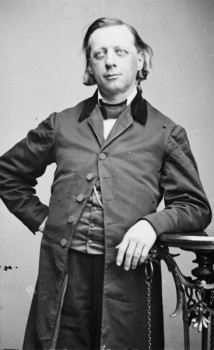In 1847, the Reverend Henry Ward Beecher (1813–1887) became the pastor of Plymouth Church in Brooklyn Heights. Within a few years, his sermons, spreading the “Gospel of Love,” captivated the country. The Sunday morning ferries from New York City to Brooklyn, which brought thousands over to see “the Great Divine” preach in his emotional style, became known as “Beecher Boats.” Beecher was the conscience of the country, an activist for abolition, the spokesman for liberal Christianity, and perhaps the most popular preacher in America. . . . But the Reverend Beecher’s affair with Elizabeth Tilton would topple Beecher from his exalted position.
Elizabeth Richards Tilton, a schoolmate of one of Beecher’s daughters and a graduate of the Brooklyn Female Seminary, married Theodore Tilton in 1855. The holy ceremony was performed by Rev. Beecher. . . . Beecher was Tilton’s father figure; Tilton loved Beecher “as he had no other man,” and Beecher had no closer friend than Tilton. . . . . Both Elizabeth and Theodore Tilton were active members of Plymouth Church, teaching Sunday school there and serving on church committees.
According to the court papers later filed, it was on October 10, 1868, with Theodore Tilton away on a lecture trip, that Elizabeth, after two years of repeated overtures, finally gave in to Beecher’s urgings for “romantic love,” and their affair began. . . . Theodore Tilton, working quietly behind the scenes, tried to force Beecher’s resignation from Plymouth Church. . . . Rebuked by Beecher’s supporters and dropped from Plymouth Church’s rolls, [Tilton] decided in 1874 to go public and expose Beecher. Decades later it would still be referred to as “The Great Scandal”; no other event of the time was more written and talked about. . . . . The trial, which captivated Brooklyn, New York City, and the nation for one hundred and twelve days, began in Brooklyn’s Courthouse on January 11, 1876. . . . . After six months of testimony by over one hundred witnesses and a week of deliberations . . . the jury announced that it could not reach a verdict.
Elizabeth Tilton, who had testified at Congregational Council and Plymouth Church hearings that Beecher was innocent . . . by 1878 could take it no more, and publicly confirmed that she had had an adulterous affair with Beecher. . . . But Beecher was unrepentant. Henry Ward Beecher, though he remained a popular preacher, was no longer taken as seriously as a moral leader by the public. Sales of his sermons and books suffered, and he became the brunt of satire.
Henry Ward Beecher is buried [in Green-Wood] not far away from Elizabeth Tilton; his stone . . . boldly proclaims “He thinketh no evil.”
–from Brooklyn’s Green-Wood Cemetery, New York’s Buried Treasure by Jeffrey I. Richman
